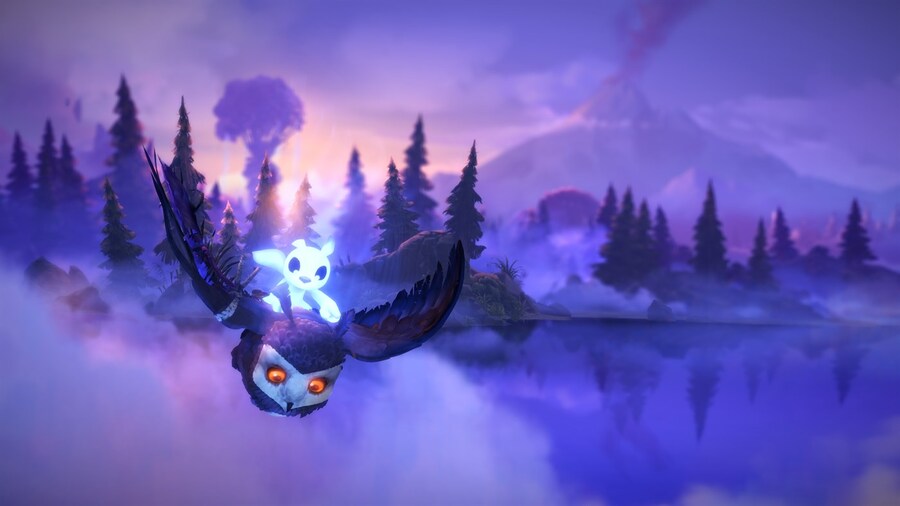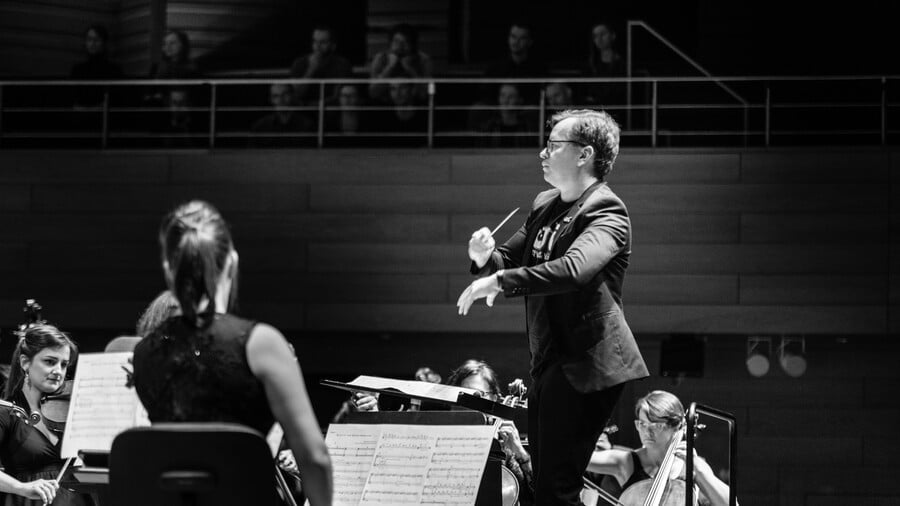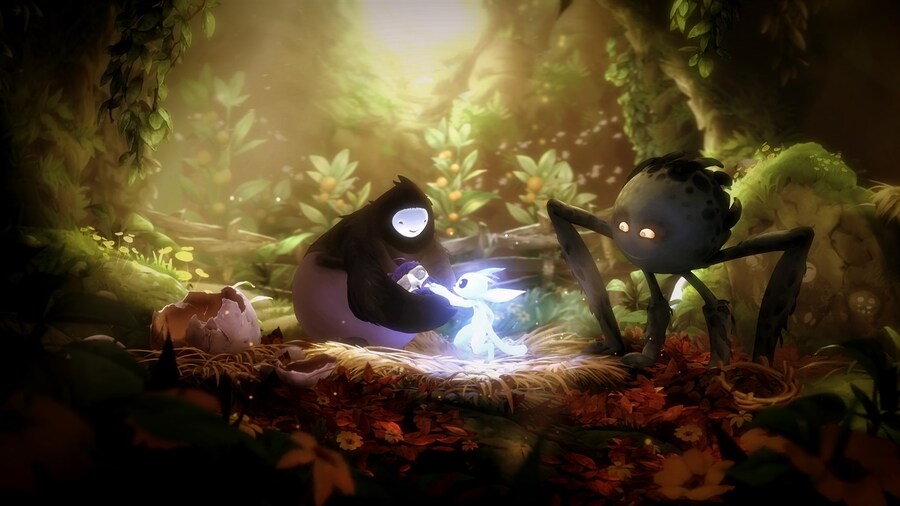It's been a huge year for Moon Studios' Ori series, celebrating the fifth anniversary of the wildly successful Ori and the Blind Forest back in March, and following it up that same month with a critically-acclaimed sequel which Microsoft recently crowned as the highest-rated game it's published in 2020.
A big reason for that is its memorable soundtrack, put together by talented composer Gareth Coker, whose additional credits include Minecraft and Ark: Survival Evolved, as well as the upcoming Immortals Fenyx Rising and Halo Infinite.
We recently sat down (virtually!) with Gareth to discuss his experiences working on the sequel and more...
Pure Xbox: Hi Gareth! First off, could you introduce yourself and give us a bit of information about your career so far?
Gareth: My name is Gareth Coker, I'm the composer for Ori and the Blind Forest and Ori and the Will of the Wisps, you'll also be able to hear my music in the upcoming Halo Infinite.
I got my start probably about nine to ten years ago after I left the University of Southern California. And then I spent a couple of years in the trenches just trying to survive a gig here and a gig there, but nothing really major. And then one day I get a message from Thomas Mahler, the director of Ori. He found my music on a website called ModDB, which is a pretty small niche website on the Internet.
There was a track that was from a student film and he said, 'if you do the music for the prototype of Ori, we're going to pitch the game. And if the publisher likes our work, then you get to do the music for the whole game.' And I thought, well, that sounds pretty sweet to me. And I did the music for the prototype.
Ori has led to several things. For example, it led to me working on the Minecraft expansions - I've done four or five. But I've done a lot of music in the Minecraft universe, which is very unlike the regular music that's in the core game for Minecraft. And of course, it's led to Halo Infinite.
Pure Xbox: How did you approach making the sequel to Ori and the Blind Forest and how much added pressure did that bring?
Gareth: Making a sequel is is really hard if you're not just going to do a cash grab. And the fact is, we probably could have made Ori 1.5 and people would have been really happy. But we didn't want to do more of the same. So, how can we take what we had and make it better, expand upon it, but also try to retain the DNA of what made the first game appeal to so many people?
The other thing with sequels is that if you are allowed to do a sequel, it usually means the first game did well. And as a result you get more resources, and more resources are both a blessing and a curse.
Yes, we can make the game bigger and better and brasher and louder and all of that. But that resulted in having to write a ton more music. And that was honestly one of the one of the biggest challenges just getting my head around, how much music the game needed, especially with what I wanted to do with the music.

Pure Xbox: How did you go about expanding upon the soundtrack for the sequel?
Gareth: Let's take the boss fights, for example. It's not something we had in the first game. The simple way to do a boss fight would be to have a big, epic music track - done. And that probably would have been fine, but I thought we could do better than that. Is there some way we can accentuate the boss fight while it is happening?
And I thought, why don't we have multiple phases in the music based on how well you're doing against the boss you're fighting? I wanted to make sure that it wasn't just the same loop repeating over and over again, because then your brain kind of tunes it out.
[It feels like] I'm making progress in the fight. And that is the philosophy that I kind of apply to the whole soundtrack, not just the boss fight. So, whenever we achieve something of significance, which can be as simple as opening a door, I'm going to try and shift the music in a subtle way that makes the player feel like they are constantly moving forward.
Pure Xbox: You've said in past interviews that you like to be hands-on when composing for games. Is this something you find particularly important?
Gareth: I think I'm the kind of composer that I need to know for sure how my music is playing back in the game. And to do that, you just need to play the game a lot. And the comparison I like to make is if I was doing a film, I'd be sitting down with the director before there's any music written and I'd be deciding where music will be played in the game.
And so I think testing is a huge part of the job. And I strongly encourage any composer where possible to to play as much of the game that they're working on as they can.
You'll get composers who are really into the technological side of things, and then you get composers like me who understand it, but don't want to deal with the nitty gritty of the actual code and the setups. And then you'll get composers who have no interest at all and they just hand off their music into the hands of the audio team. All methods are valid.
Pure Xbox: How do you think the role of music will change in games moving forward?
Gareth: I think in the coming generation, there will be a pretty big differentiator in in-game music in general. I would have to say that the vast majority of music now for games is really, really well produced and really quite well written.
We've come a long way obviously, there are really no limitations in terms of the production quality of the soundtracks. The differentiator for me is going to be not the implementation, but the choices of where the music plays in the game and how the music plays in the game.
I think there is an absolute ton of great music in video games, but I think there's far less great video game music, if you get the subtle nuance. I think moving forward, it's going to be that human touch in terms of how the music is put into the game that is going to separate a perfectly acceptable score from a score that we remember forever.

Pure Xbox: You are one of the composers in the highly-anticipated Halo Infinite. How did that role come about?
Gareth: This is another one where I get an email in my inbox, I seem to have tremendous luck with emails in my inbox! But yeah, the music supervisor for [343 Industries] is Joel Yarger.
There are a couple of things that he got quite specific on with some of the elements of my music that would apply quite well to to the Halo universe. One of the things he said was, 'it's like you're not afraid to use a major chord.' So, more happy, optimistic, upbeat, because a lot of action music is very down, it's very relentlessly dark. And actually if you look at a lot of the past Halo music, it is not relentlessly dark. That's one of the things that makes the music stand out.
The other thing he said was that he liked the way I write percussion. And Halo is really, really well known for extensive use of percussion of all sorts of different kinds of drums, and that it something that is all over [my score for] Ark: Survival Evolved.
And I think the other thing is my ability with melody, not just to write a melody, but actually I think the key is how I develop them over an entire soundtrack, and that is something I've done in pretty much every game I've worked on whether it's Ori or Ark or even Darksiders: Genesis.
The thing about Halo is there's already a ton of great existing themes to work with, and so I think he was looking for composers who can take themes and turn them into something new without forgetting what it was that made the original theme amazing and unique.
Pure Xbox: Can you talk about what it's like working on Halo Infinite and the scale of the workload compared to something like Ori?
Gareth: 343 Industries' workflow is completely different to Moon Studios. Obviously the first thing to say is that I'm not the sole composer on the project. There are three composers, and that's a different thing entirely.
Additionally, this was also my first time working with a music supervisor. However, the mechanism is still
there to get everything from the game that I need to write the music, though it's filtered by the music
supervisor so we can really focus on making the music as good as it could possibly be.
In terms of scale, I think it's impossible to compare one game to another because every game has
different musical needs. The goal is simply always to enhance the player experience with the right amount
of music implemented as best as possible.

Pure Xbox: Has the coronavirus pandemic affected your work this year?
Gareth: All composers work from home apart from the handful of in-house people that there are in the industry, so it didn't really affect our workflow, but obviously there's a transitional period for people working in the office.
In terms of recording an orchestra, we have been fortunate that the London studios that we've been using have come up with a way to record socially distanced orchestra.
If there's one thing about the pandemic, it's that the game companies have by and large been able to
continue working, so as an extension of that game composers have been able to continue working. It's
really just nice to be able to give musicians work. Performing musicians are really suffering right now so
I would encourage the public to give as much support to their favourite artists, particularly independent
ones, as much as possible.
Pure Xbox: Finally, what are your thoughts on the next generation of consoles?
Gareth: I'm very excited! I don't think we're in the golden age yet, and that's very exciting. Since I've started, I've kind of compared it to the precocious teenager that has a ton of talent but still does some stupid stuff. That's obviously a huge generalisation, but that's how I generally feel about the industry as a whole. I would say the games industry is like a 17-to-19 year old, and the real magic is going to happen when it reaches the equivalent of a 25-to-27 year old.
The graphics and the better audio and the emergent gameplay, all of that stuff I expect. But what I'm excited about are the experiences that connect to us in a deeper way.
We all saw that crazy Unreal Engine 5 demo - the result of that is going to be that every game is going to look photorealistic, so what's going to be the differentiator? It's going to be how good is your art design and your cinematography to make those photorealistic assets look as good as possible. And that is a skill that is not as prominent in the industry.
It's a very exciting time to be a gamer, especially with things like Xbox Game Pass. That's been a revelation, because there's been a ton of games I've played that I probably wouldn't have considered buying. The fact that I can play Microsoft Flight Simulator without paying anything extra is absolutely bananas to me.
There is absolutely something for everyone with next-gen, and I think that's what's really exciting. And as a composer, there's more work than ever before. I'm just grateful to be a part of it.
We'd like to thank Gareth for taking the time to talk to us. His iconic soundtrack for Ori and the Will of the Wisps is now available at various online retailers and streaming services including Bandcamp, Spotify and Steam.





Comments 7
This game is very beautiful yet easily misunderstood to be simple in rendering performance. Hats off to Moon Studios they have done lot of high quality custom engine work to make it run on Switch at 60fps.
Xbox game of the year for me. The soundtrack is a big part of that.
But Ori has it all, it melds great gameplay, with wonderful world design, beautiful graphics and a story and score that can bring tears to your eyes.
The developers have been so open about their work and now it's really interesting to see Gareth's side. The dynamic boss music for example that matches with the tempo of the fight and draws you further in. Or the evolution of the themes as the games rolls on deeply adds to the evocative atmosphere of the game. The soundtrack stays with you long after you leave Niwen.
Absolutely split between begging for an Ori sequel and being happy where it was left. Regardless looking forward to more from Moon and Gareth. Really good article @Fraser Gilbert
@themightyant Thank you!
I love his music. There is something so magical about the way it sounds. I’m kind of interested in how that will translate to Halo
Fantastic interview! I've been playing Ori 1 on Switch recently and have just been thinking over the past week or two how tremendous the music is. Perfect timing on this!
I'm waiting to play Will Of The Wisps until Series X comes out..
Great article!
Cannot wait to play Ori in 4K@120 on my Series X and new TV
Tap here to load 7 comments
Leave A Comment
Hold on there, you need to login to post a comment...